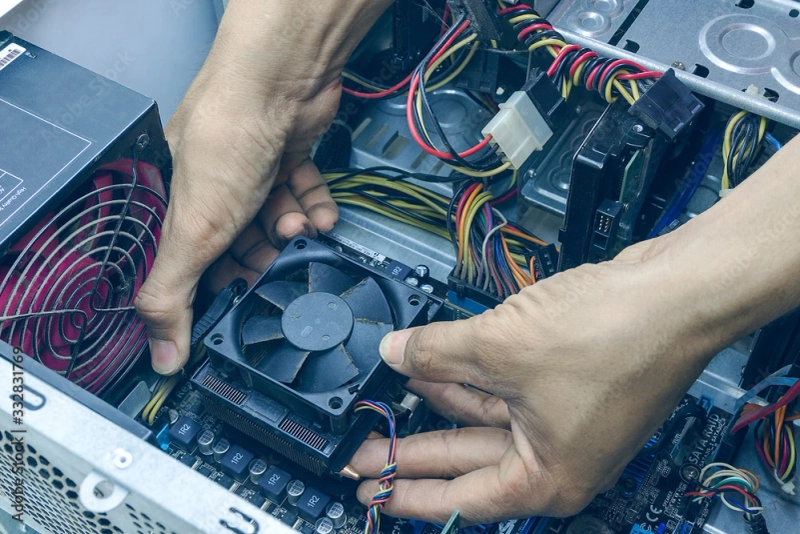Computers have become integral in our daily lives, serving as essential tools for work, communication, and entertainment. Given the investment made in purchasing a computer, it\'s essential to ensure its longevity and optimal performance. Let\'s delve into practical tips and techniques to help you maintain and prolong the life of your computer while minimizing the likelihood of repair issues.
Regular Cleaning
One of the simplest yet most effective ways to extend the lifespan of your computer is by keeping it clean. Dust and debris can accumulate inside your computer, leading to overheating and performance issues. Regular cleaning can prevent these problems and ensure your computer runs smoothly, reducing the likelihood of repair issues.
How to Clean Your Computer:
- External Cleaning: Use a soft, lint-free cloth to wipe down the exterior of your computer, including the monitor, keyboard, and mouse. This simple task can prevent dust buildup and potential damage.
- Internal Cleaning: Periodically open up your computer case and use compressed air to blow away dust from fans, heatsinks, and other components. Be careful not to touch any components with your hands, as static electricity can damage sensitive parts.
Regular cleaning not only enhances the aesthetic appeal of your computer but also improves its performance and longevity. By preventing dust buildup, you can minimize the risk of overheating and component failure, reducing the need for computer repairs.
Proper Ventilation
Proper ventilation is crucial for maintaining the optimal operating temperature of your computer components. Overheating can lead to component failure and reduced lifespan, necessitating repairs. Ensure that your computer has adequate airflow and is not placed in a confined space to minimize the risk of overheating.
Tips for Proper Ventilation:
- Clear Air Vents: Regularly check and clear any obstructions from the air vents on your computer case. Blocked vents can restrict airflow, leading to overheating and potential damage to your computer components.
- Positioning: Place your computer in a well-ventilated area with plenty of room for airflow. Avoid placing it on carpet or near heat sources, as this can impede airflow and lead to overheating.
Proper ventilation is essential for preventing overheating and ensuring the longevity of your computer components. By maintaining good airflow, you can reduce the risk of component failure.
Software Maintenance
In addition to hardware maintenance, keeping your software up to date is essential for optimal performance and security. Regular software updates help patch security vulnerabilities, fix bugs, and improve compatibility with new hardware and software, reducing the risk of software-related repair issues.
Software Maintenance Tips:
- Operating System Updates: Enable automatic updates for your operating system to ensure you receive the latest security patches and bug fixes. Keeping your operating system up to date can prevent security breaches and software-related issues.
- Driver Updates: Periodically check for updates to your device drivers, including graphics drivers, network drivers, and chipset drivers. Manufacturers often release updates to improve performance and stability.
By keeping your software up to date, you can ensure that your computer remains secure and stable, minimizing the risk of software-related issues and the need for repairs.
Backup Your Data Regularly
Data loss can occur due to hardware failures, software issues, or accidental deletion, necessitating repairs. Regularly backing up your important files and documents is essential for protecting your data and ensuring you can recover it in the event of a disaster.
Backup Strategies:
- Cloud Backup: Use cloud storage services such as Google Drive, Dropbox, or Microsoft OneDrive to automatically back up your files to the cloud. Cloud backups provide an off-site storage solution, protecting your data from hardware failures, software issues, and other disasters.
Data backups are a crucial aspect of computer maintenance, providing a safety net in the event of data loss incidents. By regularly backing up your data, you can minimize the impact of hardware failures or software issues.
Performance Upgrades
Computer upgrades can significantly enhance its performance, extend its lifespan, and save money compared to buying a new system. However, not everyone is comfortable performing these upgrades themselves. This is where professional computer businesses can be invaluable.
Benefits of Using a Professional Computer Business for Upgrades
Expert Consultation: Professional technicians can assess your current system and recommend the most beneficial upgrades based on your needs and budget. They can help you identify which components—such as RAM, storage, CPU, GPU, PSU, or motherboard—would provide the best performance boost.
Compatibility Checks: Ensuring that new components are compatible with your existing system can be challenging. Professionals can verify compatibility, preventing potential issues that could arise from incompatible hardware.
Professional Installation: Upgrading components can be complex and risky if you\'re not experienced. Professional technicians have the expertise to install and configure new hardware correctly, minimizing the risk of damage and ensuring optimal performance.
Data Backup and Migration: Before performing upgrades, professionals can back up your important data to prevent any loss. They can also assist in migrating data to new storage devices, ensuring a smooth transition without data loss.
Post-Upgrade Support: After the upgrade, professional services often include support to address any questions or issues that may arise. This ensures that your system continues to operate smoothly and efficiently.



